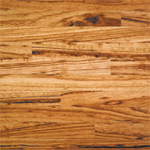Serving Upstate NY—VT—MA • For selections & prices, CALL or EMAIL US
Tigerwood
Wood Flooring Species
Scientific Name:
Astronium fraxinifolium
Other Names and Species:
Bois de zèbre
Bossona
Goncalo Alves
Kingwood
Mura
Urunday-para
Zebrawood
Zorrowood
Origin:
Latin America, mainly Brazil, Paraguay, and Uruguay.
Appearance:
The sapwood of tigerwood is brownish-white to dirty gray, while the heartwood is reddish-brown to light golden-brown in color. The species has a mottled, wavy or interlocked, irregular grain. Tigerwood has a medium to dull luster and is fine in texture.
Properties:
Tigerwood is a highly durable wood with a high resistance to beetle attack. The wood remains dimensionally stable and is reported to have no odor. Tigerwood is time-consuming to dry properly while preventing degrade.
Janka Hardness: 1850
As a flooring option, tigerwood is one of the harder and more durable woods. It falls between hickory or pecan and purpleheart in hardness, is nearly ninety-six percent as hard as merbau, a little over twenty-seven percent harder than hard maple, and about eighty-four percent as hard as santos mahogany’s ranking of 2200.
Workability:
Tigerwood is difficult to saw properly and requires carbide-tipped blades. Pre-boring is suggested, yet the wood holds nails well once applied. Glue holds well, but presetting is suggested with tigerwood flooring. This species sands fairly easily, but care should be taken as it can scratch somewhat easily in the process. Tigerwood takes polishing very easily.
Principal Uses:
Tigerwood’s uses include boat building, fine furniture, paneling, plywood, and shutters.
Learn more about available grades of
Tigerwood hardwood flooring »





